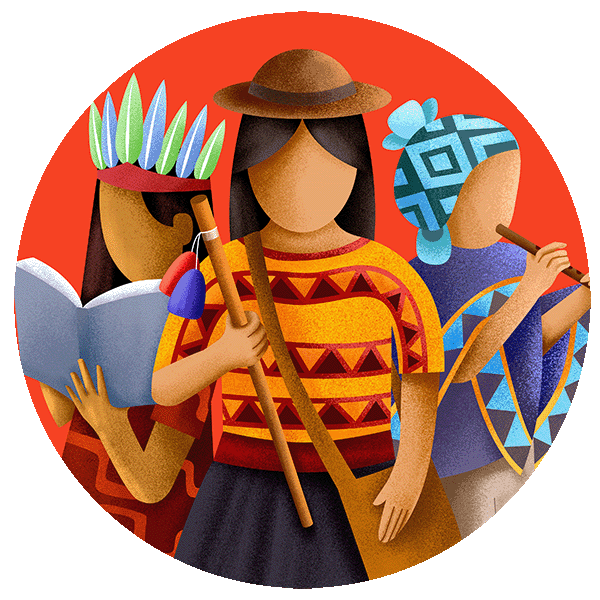
UN Special Rapporteur Victoria Tauli-Corpuz on UNPFII Theme 2018
This year's theme for conversations at the UN Permanent Forum on Indigenous Issues was "Indigenous Peoples Collective Rights to Lands and Resources". Victoria Tauli-Corpuz (Igorot Kankanaey, Philippines), UN Special Rapporteur on Indigenous Issues, says that the theme connects to many important conversations happening now in the world, including the threat that extractive industries pose to resources located on Indigenous-owned territories.
Special Rapporteur Visit To Mexico
Vicky Tauli-Corpuz, UN Special Rapporteur on the Rights of Indigenous Peoples, visited several states in Mexico to report on progress made in areas of Indigenous rights since her predecessor's trip to the country in 2003. Though the Mexican government has not fulfilled the majority of recommendations made by the former UNSR, Tauli-Corpuz notes the empowerment of autonomous municipalities since 2003 as an improvement over previous years.
The Defence of Indigenous Intellectual Rights - The Case of T'boli Women
Rosie Sula introduces this report with a beautiful chant about the legends of Lake Sebu, an important feature within the traditional territory of the T'boli people of the Philippines.
The Power Of A Walk - Seeking Recognition Through Resistance
Indigenous South Africans go on a yearly 400 mile pilgrimage to bring awareness to ongoing violations of basic human rights of South Africans, the withholding of remains and sacred items belonging to Indigenous communities by museums, as well as to reconnect to the earth and environment through the rigorous journey from coast to coast. We spoke to two South African Indigenous rights activists to hear their takes on how this tradition has shaped their activism.
Music
"Xul Kej" by Sotz'il. Used with permission.
UN International Human Solidarity Day
December 20 is International Human Solidarity Day: a day celebrate unity in diversity, and is a day to remind governments to honor their agreements to international declarations. 10 years ago to day, governments around the world voted to adopot the UN Declaration on the Rights of Indigenous Peoples. We speak with Saami Council member John Henriksen who was instrumental in the signing of this declaration, on his view on the challenges and successes in implementing these human rights for Indigenous Peoples on the ground today.
Addressing Multiple Violences Against Indigenous Women In Nepal
November 25th, 2017 is International Day for the Elimination of Violence Against Women. Indigenous women face disproportionate rates of violence and discrimination due to their intersecting identities (woman and Indigenous) which have both been historically marginalized in society. Nepali activists explain their work to end violence against women in their country, and lay out next steps for continuing the work of women's liberation around the world.
INTERVIEWEES
Yasso Kanti Bhattachan, Indigenous Women’s Federation of Nepal
Chanda Thapa Magar, Asia Indigenous Peoples Pact
Indigenous Science Is Lifesaving And Rights To It Must Be Protected
Though collaboration is crucial to finding solutions for climate change, Indigenous People must be able to maintain, protect, and control their cultural heritage, sciences, and technologies. The UN Declaration on the Rights of Indigenous Peoples provides a legal framework for intellectual ownership by Indigenous communities of their traditional knowledge. However, many additional cultural barriers to equal-footed climate change collaboration exist, such as the automatic devaluation of Indigenous science by Western science practitioners.
10 Years Of UNDRIP In Asia - A UN Expert's Perspective
Indigenous Rights Radio Producer Dev Kumar Sunuwar interviews Joan Carling, former expert member at the UN Permanent Forum on Indigenous Issues, and former general secretary of the Asian Indigenous Peoples Pact. They reflect on the first 10 years of the implementation of the UN Declaration on the Rights of Indigenous Peoples. Carling advocates for increased policy cohesion and the prioritization of Indigenous rights in global policy-making on all fronts.
Reforestation Model From Philippines Indigenous Communities
Lakes and forests in the Mt. Talinis area of the Phillipines are under threat from recent expansions of the energy industry. Apolinario Carino is working with the organization PENAGMANNAK, a federation of 17 Indigenous Peoples’ community groups, to pioneer community management strategies of reforestation designed to empower the Indigenous groups to shape the future of their lands. Apolinario hopes to share the knowledge that they have gained from these experiences in order to better combat climate change on a global scale.
"Our sacred objects are not to be hung on walls for decoration"
Indigenous Rights Radio Producer Avexnim Cojtí Ren investigates the movement to repatriate sacred objects, remains, and cultural patrimony taken without consent from Indigenous Peoples by governments, collectors, and individuals. Concepts of ownership, histories of oppression, methods of legal recourse, and recent examples of repatriation attempts all play an important role in the prospects for the return of heritage items to Indigenous Peoples.
